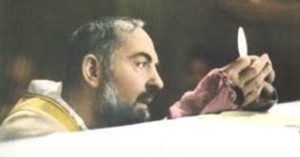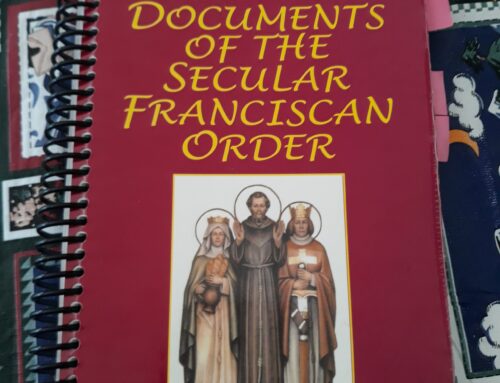[Note: This is meant for November but it applies to our situation in these times]
According to St. Padre Pio: Prayer, meditation, confession, reception and reflection
Dear Sisters and Brothers called to Penance,
November should be the one month when we feel closest to the parts of the Church that we don´t physically see day in and day out: the Church Triumphant and the Church Suffering. After all, we open the month with the Feast of All Saints; the following day, we celebrate the Feast of All Souls; and we of the Franciscan family celebrate on November 29 the Feast of All Saints of the Seraphic Order, those women and men, known and unknown, First, Second and Third Orders, Regular and Secular, who followed Father Frances into Heaven.
So what does it take to get to Heaven?
On Sunday, September 27, 2009, I had the honor of serving at a special yearly Mass at the National Basilica of the Immaculate Conception in Washington, DC, to celebrate one of the most popular of the recently canonized Franciscan saints, St. Padre Pio of Pietrelcina. The main Celebrant was Father Jacob Smith OFM, and he offered St. Padre Pio’s advice to this question that St. Pio often gave to those under his spiritual direction: Prayer, Meditation, Confession, Reception, Reflection. St. Pio said that these five were available to all striving to be holy.
With apologies to Father Jacob, who only outlined his homily, and to St. Pio, about whom I could find no print or online reference to these five, what follows is my recollection and reflection on the five.
First, prayer. St. Pio said, “Pray, hope and don´t worry. Worry is useless. God is merciful and will hear your prayer.” He also said, “Prayer is the oxygen of the soul.” Prayer is the breath of the Spirit; prayer is our communication with God. Like all communication, prayer involves our active listening, clearly and correctly, to God, followed by our active response, appropriately, politely and effectively. We may pray by words, silence, sighs, tears, actions. Prayer comes from God and returns to God.
Second, meditation. Most of us probably spend most of our prayer time in one of the recognized forms of verbal prayer. The greatest prayer of the Church is, of course, the Holy Sacrifice of the Mass. We have the Liturgy of the Hours. We have the Our Father, the Hail Mary, the Glory Be, which all serve when we pray the Rosary. Yet meditation takes us deeper, closer to God the Father, the Son and the Holy Spirit. When we pray, we need to meditate on what we are praying, for whom and to Whom we are praying, and why we are praying. When we act, whatever actions we perform, we need to do the same: meditate on what we are doing, to whom and for whom we are doing what we are doing, and why are we doing what we are doing. Prayer may be noisy; meditation should usually be silent.
Third, confession. All Franciscans are called to Penance, a turning away from self and sin and a turning toward the Gospel Life. Article Seven of our Secular Franciscan Rule says it so well: “United by their vocation as ´brothers and sisters of penance´ and motivated by the dynamic power of the gospel, let them conform their thoughts and deeds to those of Christ by means of that radical interior change which the gospel calls ´conversion.´ Human frailty makes it necessary that this conversion be carried out daily. On this road to renewal the sacrament of reconciliation is the privileged sign of the Father´s mercy and the source of grace.” St. Pio spent hours and hours celebrating the Sacrament of Penance and urged frequent Confession, certainly as soon as possible after the commission of a major sin and as often as needed, at least once a month, since human memory is so short.
Fourth, reception. Our Lord Himself said: “Amen, amen, I say to you, unless you eat the flesh of the Son of man and drink his blood, you have no life in you” (John 6:53). Again, our Holy Rule, Article Five, guides us: “The faith of St. Francis, who often said, ´I see nothing bodily of the Most High Son of God in this world except His most holy body and blood,´ should be the inspiration and pattern of their Eucharistic life.” Because of the power and efficacy of proper reception of the Most Blessed Sacrament, St. Pio urged frequent, even daily, reception of Holy Communion, if and only if the recipient were properly disposed.
Fifth, reflection. St. Pio urged constant, even daily, reflection on “The Four Last Things”: Death, Judgment, Heaven and Hell. He urged that this reflection not be done in a fearful manner because of his quote above to pray, hope and not worry, trusting always in the love and mercy of God. Rather, the reflection on the four last things was to focus our lives. Where are we going? How are we getting there? If the basic purpose of our lives is not to know, love and serve God in this life with our whole hearts, minds, bodies and spirits, then what are we about? What is more important?
Note that St. Pio has made no comment on what exactly else we are doing with our lives. We may be Poor Clares spending our lives in cloistered contemplation, or we may be busy wives, mothers and workers out in the world. It doesn´t matter. Prayer, meditation, confession, reception and reflection can apply to all.
Reflection Questions
- Why is November a particularly good month for a Franciscan to pray seriously about how best to get to heaven?
- According to St. Padre Pio, what is one best way to get to heaven? Why?
- According to St. Padre Pio, what is a second best way to get to heaven? Why?
- According to St. Padre Pio, what is a third best way to get to heaven? Why?
- According to St. Padre Pio, what is a fourth best way to get to heaven? Why?
- According to St. Padre Pio, what is a fifth best way to get to heaven? Why?
- Of the five ways suggested by St. Padre Pio to get to heaven, which one do you feel you most need to work on? Why?
Note: This is meant for November but it applies to our situation in these times
This is an excerpt from a series of articles by the late Deacon Tom Bello, OFS, former Minister of the National Secular Franciscan Order – USA. “Many of these essays were originally published in TAU-USA, our national newsletter,” said Jan Parker, OFS, current National Minister. “They are excellent for reflection and ongoing formation.” Jan helped Tom publish these essays in book form. It is called For All The Saints: St. Francis’s Five-Point Plan for Salvation and is available from Tau Publishing. These excerpts will appear several times a week on the Secular Franciscans website.




Leave A Comment